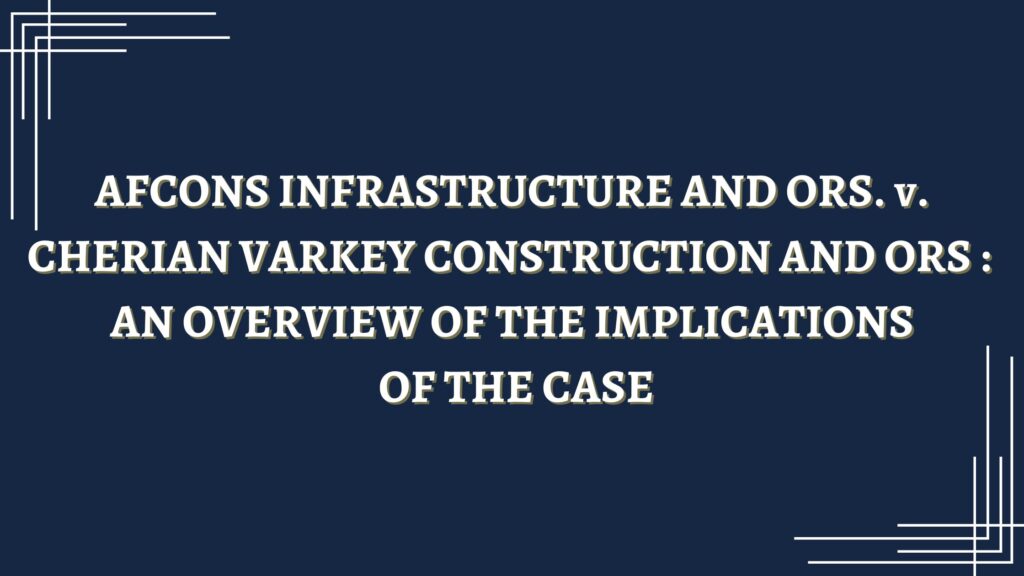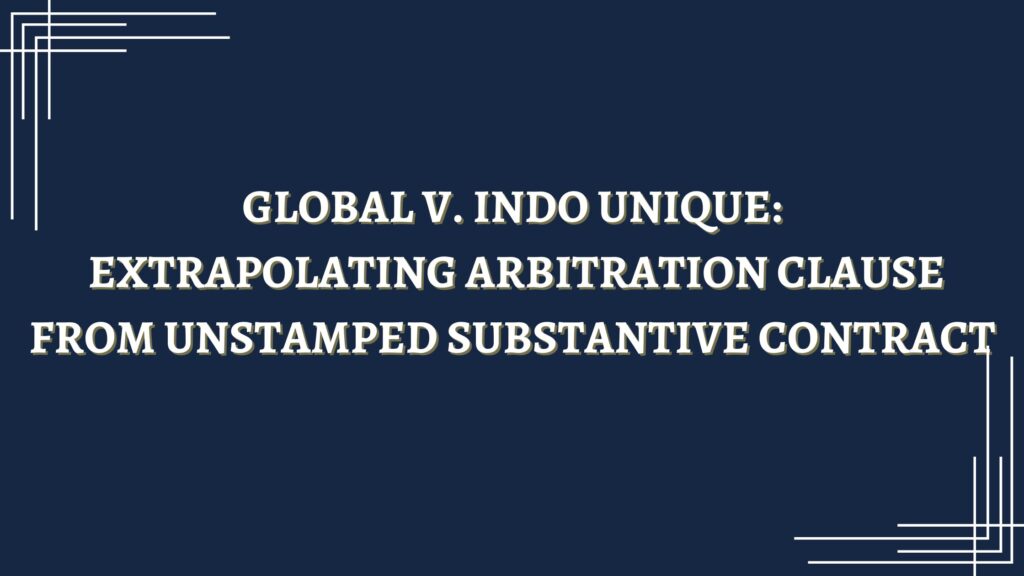Afcons Infrastructure and ors. v. Cherian Varkey Construction And ors. : An overview of the implications of the case
Authors – Naman Gowda & Ibban Javed Year – 3rd Year Institute – National Law Institute University, Bhopal Introduction Mediation is a form of Alternative Dispute Resolution (ADR) outside the confines of courts wherein a neutral third party assists the parties to the dispute in arriving at a mutually amicable solution. ADR as a whole is gaining more traction nowadays due to the strenuous process of resolving disputes in a court of law. However, the drawbacks associated with different forms of ADR makes it necessary to look at the suitability of each approach. Section 89 of the Code of Civil Procedure allows Courts to refer a dispute to ADR for resolution. The four methods of ADR that are mentioned under section 89 are: – Arbitration, Conciliation, Judicial settlement including settlement through Lok Adalat, or Mediation Effectiveness of mediation In the Afcons Construction Ltd. v. Cherian Varkey Construction[1] judgement, the Supreme Court held that the while the court can consider the aforementioned methods, arbitration can only be referred when both the parties to the dispute have consented to the same. The reason behind this is that arbitration is the only adjudicatory method amongst the four and the absence of consent of a party makes it even more likely that one of them may not be content with the award pronounced by the tribunal. Making things worse, an appeal cannot be made against the award of a tribunal based on its merits and it can only be set aside based on certain grounds mentioned under section 34 of the Arbitration and Conciliation Act, 1996[2]. In this regard, why is mediation more effective? It is a non-adjudicatory method which keeps the dispute within the judicial system and in case an amicable settlement is not reached between the parties the same goes back to trial. While this may seem to be defeating the intention behind referring the dispute to ADR, it preserves the essence of the justice system in ensuring aggrieved parties have some form of legal recourse. Additionally, the Court also enumerated certain types of disputes as unsuitable for ADR and thus reducing the chance of failure of the those referred to ADR. Disputes suitable for ADR Disputes that are suitable for resolution through mediation are ones which are complicated and lengthy and mediation would be very effective as there is a chance of quicker resolution. The court listed the types of disputes suitable for ADR:- All cases relating to trade, commerce and contracts; All cases arising from strained or soured relationships such as matrimonial disputes and partnership disputes. All cases where there is need to continue a pre-existing relationship in spite of the dispute such as disputes arising between employers and employee. All cases relating to tortious liability including claims for motor accidents; All consumer disputes. The Supreme Court, in the matter of M.R. Krishna Murthi v. The New India Assurance Co. Ltd and Ors.[3], laid emphasis on the need for ADR with regard to motor vehicle accident claims. The Court recognized the need for speedy resolution of accident claims in order to ensure that victims are awarded compensation at the earliest. The Court also recommended the establishment of a Motor Accidents Mediation Authority (MAMA) in every district and incorporating a provision for the same in the Motor Vehicles Act[4]. Furthermore, it also recommended the National Legal Services Authority to oversee the setting up of Motor Accident Mediation Cells as an interim measure until a provision is made for the same in the Motor Vehicles Act. The Supreme Court’s effort in this regard has been continuous as it recently constituted a panel of mediation experts to prepare a draft mediation law, seeking to define a code of conduct for mediators and address aspects such as the enforceability of mediation settlements, confidentiality of the proceedings and neutrality to name a few[5]. Conclusion There is a very minimal chance of a mediation settlement being appealed by one of the parties. A mediation settlement can be challenged on the same grounds as an arbitral award is challenged. But the non-adjudicatory nature of mediation significantly reduces the risk a settlement being challenged as both the parties work together towards reaching a mutually beneficial compromise and after having made such an effort, the likelihood of them being content with the same is more as opposed to an arbitration. Despite all these benefits, conventional methods are still preferred by a vast majority. The shift to mediation was never expected to be immediate one, but a central legislation, which provides legal sanctity to mediation settlements, is necessary in order make mediation the go-to platform for dispute resolution. [1](2010) 8 SCC 24. [2]The Arbitration and Conciliation Act, 1996, d 34. [3]2019 (4) SCALE 362. [4]Motor Vehicles Act. [5]Ajmer Singh, Supreme Court forms committee to draft mediation law, will send to government, The Economic Times, (Sept. 9, 2020, 11:45 PM), https://economictimes.indiatimes.com/news/politics-and-nation/supreme-court-forms-committee-to-draft-mediation-law-will-send-to-government/articleshow/73394043.cms?from=mdr.


